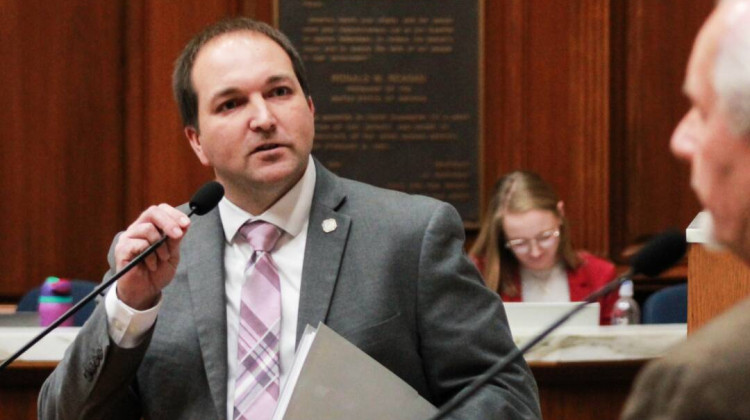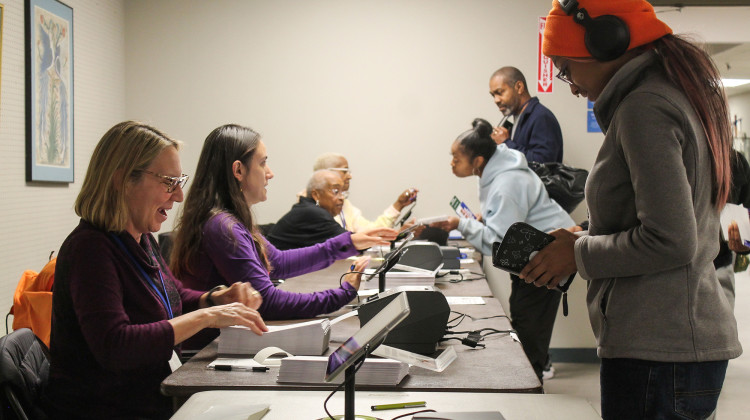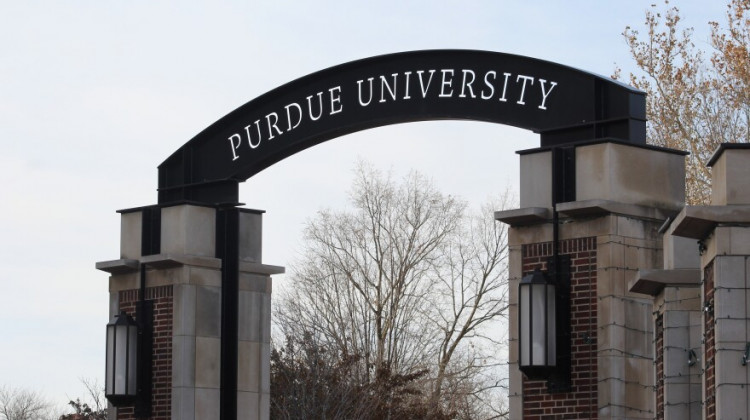Indiana lawmakers filed legislation this session aimed at fixing systemic problems for students with disabilities, including the use and oversight of restraint and seclusion in schools.
Republican Rep. Becky Cash (R-Zionsville), who authored House Bill 1073, said the legislation is a response to a WFYI investigation that found that some schools weren’t accurately reporting how often they restrain and forcibly isolate students.
The reporting also uncovered a lack of oversight at the state level that prevented officials from knowing whether schools are using these interventions as intended under Indiana law.
Cash, who is a parent of several children with disabilities, said the legislation was also inspired by an incident in Brownsburg schools in which a 7-year-old student with a disability was told by staff to eat his own vomit. Cash’s district includes a portion of Brownsburg.
“We need meaningful legislation that will better protect children with special needs,” she said during a recent interview with WFYI.
But if lawmakers balk at the estimated expense of the legislation for local schools, Cash said she would propose banning seclusion altogether. States including Florida, Massachusetts and Georgia have already done away with the practice in schools.
“To be blatantly honest, I don't think it's too big of a step to ban seclusion,” she said.
A separate bill proposed by a top GOP lawmaker would reshape the way schools and families settle disputes over special education services.
Here’s a look at each proposal:
Cameras in classrooms
HB 1073 would require schools to install cameras in special education classrooms, seclusion and time-out areas as well as sensory rooms. The cameras must be recording whenever these areas are in use, and footage would need to be stored for 60 days. Parents would only be able to request to review footage of a specific incident.
“These are not live cameras that parents can watch throughout the day,” Cash said.
It’s estimated schools would pay between $2,000 and $10,000 per classroom — depending on the type of recording equipment necessary to meet the bill’s requirements — to install these cameras, according to the nonpartisan Legislative Services Agency.
A focus on ‘time-out’
The bill would add time-out to the list of interventions schools should use only as a last resort. Schools would be required to document and report time-out incidents to a student’s parent or guardian, and the Indiana Department of Education.
Currently, schools aren’t required to notify parents when a child is put in time-out.
Cash said there is a concern in some districts that school staff “are calling things time-outs that are actually seclusions.”

A seclusion is defined as the confinement of a student alone in an area from which they are physically prevented from leaving.
Cash said she is aware of “many, many stories” of children who have been placed in rooms, and sometimes closets, within school buildings, as a form of time-out. She said school officials have told her these incidents don’t count as seclusions because the children could technically leave these spaces.
“We want time-outs minimized, we want the amount of time that a child is away from the educational environment to be minimized,” Cash said.
State reports and behavior interventionist training
HB 1073 would also make changes at the state level. It would require the Commision on Seclusion and Restraint to meet twice per year — rather than the currently required annual meeting — and to provide reports to the state’s advisory council on the education of children with disabilities.
Commission members previously told WFYI that they lost focus since its inception roughly a decade ago; during meetings between 2019 and 2021, members debated their purpose and intended role.
But, for Cash, the goal is clear: the commission should be helping schools minimize their use of seclusion, restraint and, under her proposed bill, time-outs as well.
“I mean, I'm just gonna flat out say that we should not have kids in closets in schools. And I don't think that the majority of people know that that is happening,” Cash said.
The bill would also require a behavior interventionist at each school building. Cash said the intent is not to force schools to hire behavior interventionists, but rather to provide deescalation training to existing school employees.
The cost of intervention training for each employee ranges between $1,300 to $6,000, according to the Legislative Services Agency. Whereas, the agency wrote, it would cost districts between $59,000 and $85,000 annually — excluding benefit expenses — to hire a behavior interventionist.
House Bill 1380: Due Process
When schools and families disagree over special education services, parents can request something called a due process hearing — similar to a court case. It’s also a traumatic and adversarial process for families and schools that can rack up hundreds of thousands of dollars in legal fees and destroy relationships between parents and district employees.
House Bill 1380 would, under certain circumstances, shift the burden of proof in due process proceedings from parents to schools — meaning the district would have to prove they provided an appropriate education to a student.
Currently in Indiana, and in most states, parents are required to prove to an independent hearing officer that the school hasn’t met their legal obligation.

HB 1380 would also prohibit school districts from requiring parents to sign non-disclosure or confidentiality agreements as part of a special education settlement agreement. WFYI previously reported schools frequently request non-disclosure agreements or confidentiality agreements as a condition of a settlement.
The bill, authored by House Education Committee Chair Rep. Bob Behning (R-Indianapolis), passed out of committee in a 7-4 vote. All four committee Democrats voted against the legislation, which includes many unrelated components.
Similar due process legislation failed in a rare unanimous vote in the Senate in 2022.
Major education associations oppose the bill, including: Indiana School Boards Association, the Indiana Association of Public School Superintendents, the Indiana Coalition for Growing and Suburban Schools and the Indiana Urban School Association.
Lisa Tanselle, general counsel for ISBA, told lawmakers before the committee vote that shifting the burden of proof to schools would result in increased litigation from parents. But Tanselle failed to provide evidence for this claim.
Multiple groups that represent the interests of families and children with disabilities testified in favor of the legislation.
“The reality is that there's a great power imbalance in these educational disputes. On one end is the often unrepresented student with a disability and their family trying to navigate a very complicated process to simply obtain appropriate educational services,” said Tom Crishon, general counsel and legal director for Indiana Disability Rights. “On the other end is a publicly funded school district with, at least in the family's eyes, unlimited resources and expertise.
“This section [of the bill] places the burden on the side already in the best position to prove its case, which is the school.”
The bill now moves on to the full House for second reading.
Contact WFYI education reporter Lee V. Gaines at lgaines@wfyi.org.
 DONATE
DONATE







 Support WFYI. We can't do it without you.
Support WFYI. We can't do it without you.